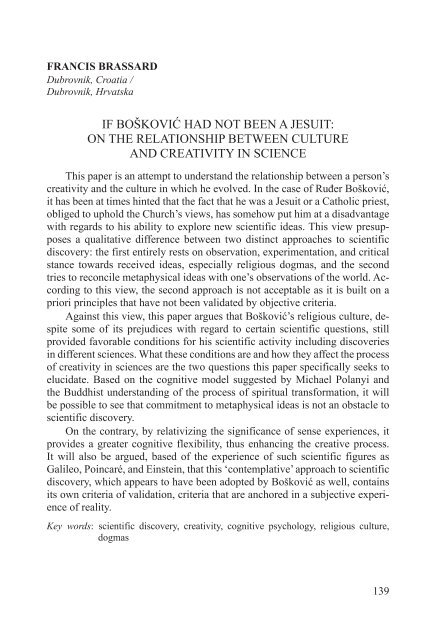Programska knjižica - Hrvatsko filozofsko društvo
Programska knjižica - Hrvatsko filozofsko društvo
Programska knjižica - Hrvatsko filozofsko društvo
You also want an ePaper? Increase the reach of your titles
YUMPU automatically turns print PDFs into web optimized ePapers that Google loves.
FRANCIS BRASSARD<br />
Dubrovnik, Croatia /<br />
Dubrovnik, Hrvatska<br />
IF BOŠKOVIĆ HAD NOT BEEN A JESUIT:<br />
ON THE RELATIONSHIP BETWEEN CULTURE<br />
AND CREATIVITY IN SCIENCE<br />
This paper is an attempt to understand the relationship between a person’s<br />
creativity and the culture in which he evolved. In the case of Ruđer Bošković,<br />
it has been at times hinted that the fact that he was a Jesuit or a Catholic priest,<br />
obliged to uphold the Church’s views, has somehow put him at a disadvantage<br />
with regards to his ability to explore new scientific ideas. This view presupposes<br />
a qualitative difference between two distinct approaches to scientific<br />
discovery: the first entirely rests on observation, experimentation, and critical<br />
stance towards received ideas, especially religious dogmas, and the second<br />
tries to reconcile metaphysical ideas with one’s observations of the world. According<br />
to this view, the second approach is not acceptable as it is built on a<br />
priori principles that have not been validated by objective criteria.<br />
Against this view, this paper argues that Bošković’s religious culture, despite<br />
some of its prejudices with regard to certain scientific questions, still<br />
provided favorable conditions for his scientific activity including discoveries<br />
in different sciences. What these conditions are and how they affect the process<br />
of creativity in sciences are the two questions this paper specifically seeks to<br />
elucidate. Based on the cognitive model suggested by Michael Polanyi and<br />
the Buddhist understanding of the process of spiritual transformation, it will<br />
be possible to see that commitment to metaphysical ideas is not an obstacle to<br />
scientific discovery.<br />
On the contrary, by relativizing the significance of sense experiences, it<br />
provides a greater cognitive flexibility, thus enhancing the creative process.<br />
It will also be argued, based of the experience of such scientific figures as<br />
Galileo, Poincaré, and Einstein, that this ‘contemplative’ approach to scientific<br />
discovery, which appears to have been adopted by Bošković as well, contains<br />
its own criteria of validation, criteria that are anchored in a subjective experience<br />
of reality.<br />
Key words: scientific discovery, creativity, cognitive psychology, religious culture,<br />
dogmas<br />
139

















